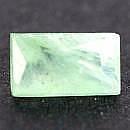|
ClassicGems.net |
|
|
 |
|
Anapaite |
|
|
Discovered in 1902; IMA status: Valid (pre-IMA; Grandfathered) |
|||
|
|
|
Chemistry |
|
|
|
|
|
Ca2Fe2+(PO4)2 • 4(H2O) |
|
|
|
Hydrated Calcium Iron Phosphate |
|
Molecular Weight: |
398.01 gm |
|
Composition: |
Calcium |
20.14 % |
Ca |
28.18 % |
CaO |
|
|
Iron |
14.03 % |
Fe |
18.05 % |
FeO |
|
|
Phosphorus |
15.56 % |
P |
35.66 % |
P2O5 |
|
|
Hydrogen |
2.03 % |
H |
18.11 % |
H2O |
|
|
Oxygen |
48.24 % |
O |
|
|
|
|
|
100.00 % |
|
100.00 % |
= TOTAL OXIDE |
|
|
|
||||
|
Classification |
|
|
|
|
|
Phosphates |
|
|
7/C.19-10 |
|
|
|
8 : PHOSPHATES, ARSENATES, VANADATES
|
|
Related to: |
n/a |
|
Varieties: |
None |
|
Synonyms: |
Anapäite, Tamanite, ICSD 200477, PDF 34-148 |
|
|
|
|
Crystal Data |
|
|
|
|
|
Crystals are tabular on {110}, modified by {001}, {010}, {100}, {111}, {111}, {011}, to 1 cm. Commonly in rosettes and subparallel aggregates and crusts of crystals; fibrous, and in nodules. |
|
|
None |
|
|
|
|
|
Physical Properties |
|
|
|
|
|
Perfect on {001}, distinct on {010} |
|
|
Conchoidal |
|
|
Flexible |
|
|
3.5 |
|
|
2.816 (g/cm3) |
|
|
None |
|
|
Not Radioactive |
|
|
|
|
|
Optical Properties |
|
|
|
|
|
Green to pale green, greenish white, milky white; colorless to pale green in transmitted light |
|
|
Transparent |
|
|
Vitreous, sub-vitreous, resinous, waxy, greasy |
|
|
1.602 - 1.649 Biaxial ( + ) |
|
|
0.037 - 0.047 |
|
|
r > v; marked |
|
|
Not visible |
|
|
|
|
|
Occurances |
|
|
|
|
|
Geological Setting: |
In oolitic iron ore, and in the stems of fossil trees (Anapa, Russia); in lacustrine sediments. |
|
Common Associations: |
Fairfieldite, Vivianite, Siderite |
|
Common Impurities: |
n/a |
|
Type Locality: |
Zheleznyi Rog (Zheleznaya balka), Anapa, Taman Peninsula, Krasnodarskiy Kray, Russia |
|
Year Discovered: |
1902 |
|
View mineral photos: |
|
|
|
|
|
More Information |
|
|
|
|
|
|
|
|
|
|
|
Anapaite is a rare and beautiful phosphate mineral. Mineral? Maybe, maybe not. Some mineral purists say that Anapaite should not be considered a mineral. This is because Anapaite has a somewhat organic origin. The purest definition of a mineral is that it must have an inorganic origin (ie. it is not made by a plant or animal). Anapaite is frequently found in fossil shell remains. Does this mean that the shell created the Anapaite or did it simply provide the calcium needed or change the environment of crystallization, such as pH, needed for Anapaite to form? In any case, Anapaite is classified as a mineral, a hydrated calcium iron phosphate mineral to be exact. It is a beautiful and unique mineral that commonly forms as lime green rosettes or rounded nodules in fossil shells. They almost look like a bright green pearl perched in the fossil shell. Anapaite crystals are indistinct within the rosettes and nodules and may look more like small bundles of glass shards than true crystals. Anapaite mineral specimens can be very attractive and collectible. Faceted Anapaite is a true rarity. Anapaite was named by Arthur Sachs in 1902 for the type locality at Anapa, Taman Peninsula, Russia. Locations for Anapaite: in Russia, at an iron mine on Cape Zheleznyi Rog Cape, near Anapa, Taman Peninsula. As fine specimens at Kerch, Crimean Peninsula, Ukraine. In the Castelnuovo and Allori mines, Santa Barbara lignite district, near San Giovani, Tuscany, Italy. At Messel, Hesse, Germany. In the Cerdanya basin, east to southwest of Belver, Catalonia Province, Spain. In the USA, from Lewis Well, near Corcoran, Kings County, California; at the MacArthur mine, near Yerington, Lyon County, Nevada; in the Palermo #1 mine, near North Groton, Grafton County, New Hampshire. |
|
|
Anapaite gems for sale: We have not photographed our Anapaite gems yet. Please check back soon. |